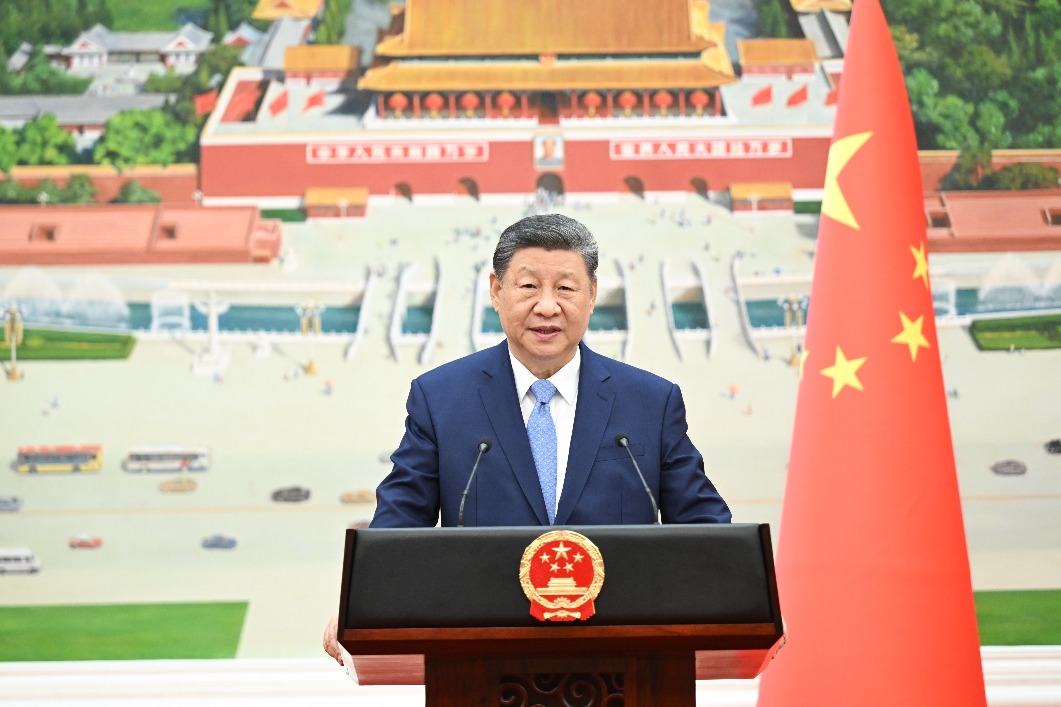Clothing traders try on hope after lean times

Editor's note: This news column showcases stories from around the world that bring a touch of positivity to the fight against the deadly coronavirus.
NAIROBI, Kenya-Mercy Mutheu's stall sits in the middle of a vibrant open-air market with noticeably few customers selecting the secondhand clothes on display.
Mutheu is struggling to keep her makeshift stall open in the Mutindwa market, on the eastern fringes of the Kenyan capital Nairobi, as she faces the harsh economic times brought by the COVID-19 pandemic.
"Sales have slumped but we persist because we have families that are dependent on us," Mutheu said in an interview on Tuesday. "Traders are aware that customers are wary of coming to the market but we want to assure them that we have taken the necessary precaution to ensure our environment is not a high-transmission area."
Kenyan traders dealing in secondhand clothes and shoes have been forced to redefine their business model to stay afloat and mitigate the impacts of the pandemic.
Their fortunes now appear to be brightening with reduced curfew hours and the lifting of movement restrictions.
"I have a washing station where customers can sanitize their hands before proceeding to select what they want. I do not support the huddling of customers around the shop as this poses a great risk to me and them," said Mutheu.
She said that she can now breathe a sigh of relief after an inter-county movement ban was lifted last week, adding that the measure had cut her stall off from most of her customers.
The country's imports of secondhand clothes came to 17.77 billion shillings (about $10.7 million) in 2019, according to the Kenya National Bureau of Statistics.
The demand for secondhand garments in the country is fueled by their durability and affordability, which appeal to Kenyans across the socio-economic spectrum.
"The beauty of mitumbas is that they can be worn by everybody because of affordability," said Mutheu, referring to the local term for secondhand clothes and shoes."Clothes from renowned international brands that have been gently worn are particularly attractive to customers."
Mutheu, who graduated from university with a major in public relations, is upbeat that her business will pick up soon with the resumption of international and local flights signaling increased foot traffic into the capital.
Betty Mbura, a 32-year-old secondhand shoe trader from the northwestern Kenyan county of Laikipia, said she is keen to jumpstart her business after branching out into digital platforms.
"My tech-savvy son noted that having a digital presence for my business would help increase my revenues that were dwindling because of COVID-19-related restrictions," said Mbura, adding that "he was not wrong; things are looking up".
Mbura said she had been unable to travel to Nairobi's main open-air market to get her goods because of virus containment measures and, as a result, she partnered with a middleman who organized for the goods to reach her on time. But that arrangement ran into problems.
Lift of measures
Mbura is now pleased that she can travel to Nairobi after President Uhuru Kenyatta on July 6 ordered the lifting of containment measures.
"I am happy that I can travel to Nairobi and select what my repeat customers find attractive," said Mbura.
She said that adding an online presence for her business has kept her physical shop open and she has experienced a gradual increase in revenue.
Traders from Kenya's largest secondhand distribution market, Gikomba have been experiencing tribulations ranging from perennial fires to, more recently, the demolition of stalls to pave way for the construction of a road.
The traders have attributed the increased prices for their goods to the seemingly never-ending woes.
Betty Maina, the Cabinet's secretary of trade, has signaled a possible lifting of a temporary ban on imports of secondhand clothes after endorsing moves by the statistics agency to develop protocols aimed at resuscitating a trade that employs millions of Kenyans.
"We have received their petition and they need to work together with the Kenya National Bureau of Statistics to advise if there is a way or mechanism for handling the matter given the fact that the pandemic is going on for a bit longer than people had thought," Maina said last week.
Xinhua
Today's Top News
- China sees over 33.7 billion inter-regional trips in H1
- BRICS justifiably calls for IMF reforms
- Xi receives credentials of new ambassadors to China
- Sino-US trade talks key to global supply chain
- Medical insurance covers 95% citizens
- Great opportunities mark 50th anniversary






























